Bi/Pan (she/her) Multifandom blog. Reblogs abound. Current brain rot - Kinnporsche. Avatar by @Mhuu_96. Banner by @apoluvrs
Don't wanna be here? Send us removal request.
Text
“We’re in a fanfic drought” Tell the writers you like their work.
“All Tumblr ever does is write oneshots now” Tell the writers that you��d love to see them write longer things.
“Nobody updates their fics anymore” Tell the writers you love the fic and want to see more of it.
Tell the writers.
9K notes
·
View notes
Text
Symbolism in Shine
The Moon






We have already seen two Trin looks that feature a moon pin 🌙
Thanwa's band is called Moonshine, a name that could refer to the light of the moon but is also a term for high proof liquor, made and/or distributed illegally. Traditionally it is brewed at night to avoid suspicion but I think the subterfuge nature of Moonshine also matches the themes of queer love in that time period.
The Shine OST by SlotMachine is called Far Side of the Moon
We hear Thanwa say "welcome to the other side of the moon," when he meets Trin. That sounds like a reference to Pink Floyd's album The Dark Side of the Moon which came out in 1973 and addresses issues like conflict, death and greed among others.
I also think of the song The Moon Represents My Heart, originally sung by Taiwanese singer Chen Fen-lan but made famous by Teresa Teng and also by queer icon Leslie Cheung. Apo has sung this song before accompanied by Mile on guitar 😊
youtube
There is also the Japanese saying "the moon looks beautiful tonight," which is an indirect way of confessing your love for someone.

All that to say, the moon is a very romantic symbol 🤍🖤
Now I shall ramble a bit about tarot card meanings for the moon and the sun which I shall put under here ⬇️
Tarot Card Meanings

The Moon: 🌛
This card can represent that something is not as it seems in your life. Pay attention to your dreams as your subconscious may be trying to tell you something. Trust your instincts to see past illusions.
The card can also indicate that you are letting fears or anxiety overwhelm you. Mental health issues may arise through dormant insecurities or repressed feelings.

The Sun: 🌞
In contrast, the sun card represents optimism, positivity, freedom and fun. Success and freedom and generally happy vibes will draw people towards you.
It indicates feelings of liberation, a carefree and self assured attitude.

Trin and Thanwa
I included the sun as well because on a surface level at least, it looks like Trin is the moon and Thanwa is the sun but I suspect that there is a lot more overlap between them than initially meets the eye.
There are a lot of other places to look for moon and sun interpretations, such as depictions in mythology for example and it is not lost on me that Apo's designs for his Skechers collaboration feature sun and moon motifs as well 😏 but I think I have gone on long enough 😅
#apo nattawin#mile phakphum#mileapo#shine#shine the series#lgbtq+#thai drama#thai series#thai ql#thai bl#original gay series#kinnporsche cast#symbolism in shine#be on cloud#shine meta#reblog for additional info
61 notes
·
View notes
Text
What’s completely wild to me about Shine is how it explores deep ideological divides, each embodied by privileged men —hedonist, capitalist, journalist, military leader, and foreign-trained academic— who are also grappling with their queer identities during a time of political upheaval.
The voice we don’t hear? The people. Student activists stand in for them because institutions of that era didn’t give ordinary citizens a say in what happened to their lives. The same institutions that, directly or indirectly, each of these men benefit from.
Shine feels like it’s weaving a charged, emotional tapestry, where the personal and the political collide in the lives of queer men. I’m so excited to see how this series holds all those tensions together and manifests them on the screen.

#Shine#ShineWeTVatATF#Be on Cloud#shine the series#mileapo#mile phakphum#apo nattawin#historical series#thai bl#bl series#thai drama#thai series#thailand#Sera's Posts#meta#men of shine
71 notes
·
View notes
Text
In the trailer for Shine, the moon is a persistent, almost haunting image. Thanwa is the lead singer of Moon Shine. He welcomes Trin to his hedonistic paradise with the words (translated): “Welcome to the other side of the moon.” The OST features the track “The Far Side of the Moon,” and Trin himself wears a moon-shaped pin on the lapel of his jacket.
In Thai literature and poetry, the moon carries layered meanings of love, longing, illusion, and impermanence. In Western lit, we recognize Juliet warning Romeo to not swear his love by the inconstant moon, and rightly so. Its phases reflect life’s rhythms in its tenderness, its betrayals, and its inevitable transformations. People come into our lives and people leave. Nothing stays the same.
We see the moon’s face, trace shapes and stories into its surface, but there’s always a side we cannot see, even as the sun illuminates it.
That hidden side—unseen, yet always present—feels like the heart of Shine.
It’s no accident that, during one of the most turbulent periods in Thai modern history, the moon emerges as the story’s central metaphor. It mirrors not just national upheaval, but personal revolutions as well.
Every character in Shine is changing - falling in love, breaking apart, becoming someone new. There is the change society sees, but there is also a transformation happening in private, far from public view.
We’re not just watching a love story. We’re watching people fight in the light while wrestling with their fundamental desires in the shadows. Society is in turmoil. Ideologies are in upheaval. The only constant in the lives of these characters is that by the end, they will be transformed, and nothing will ever be the same.

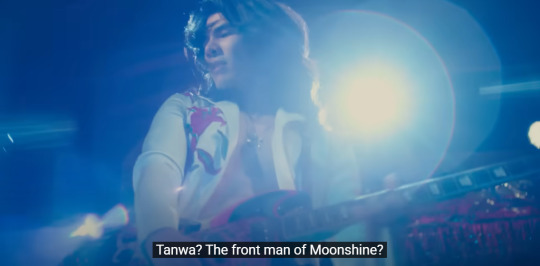


#Shine#ShineWeTVatATF#Be on Cloud#shine the series#mileapo#mile phakphum#apo nattawin#historical series#thai bl#bl series#thai drama#thai series#thailand#Sera's Posts#symbolism#moon symbolism#thai literature#meta
69 notes
·
View notes
Text
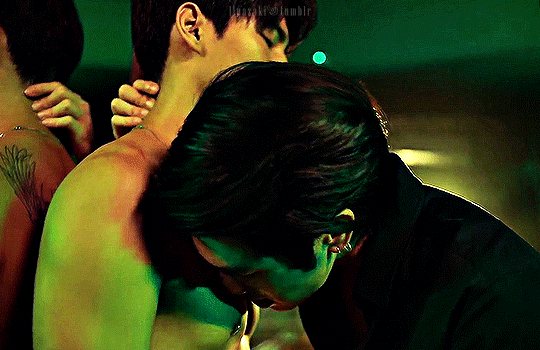
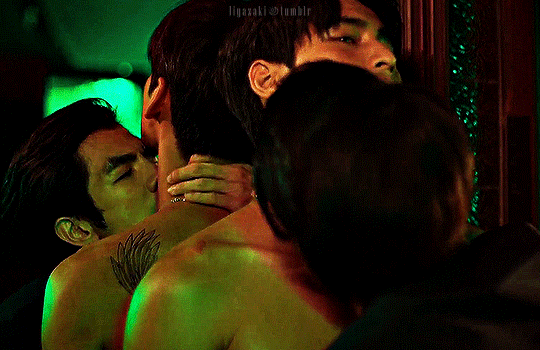
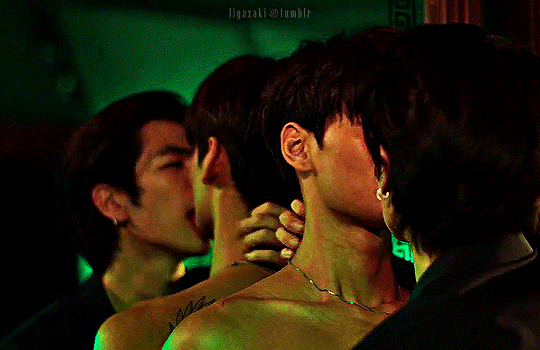
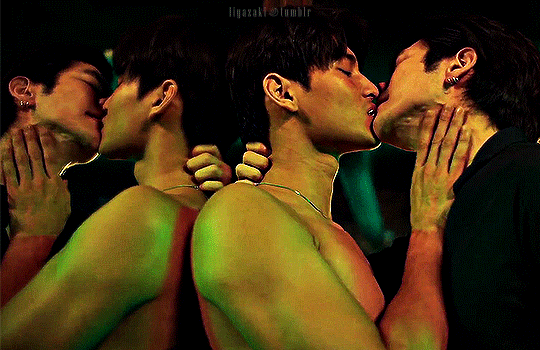



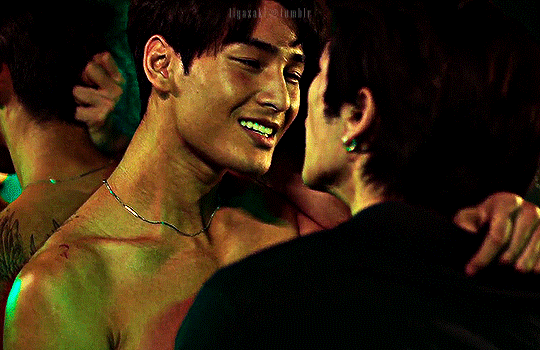

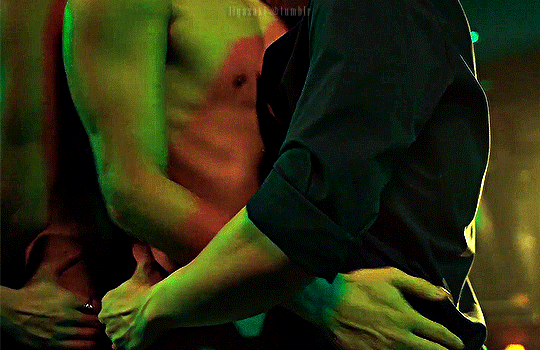
touch me- remind me who I am. -stanley kunitz
kinnporsche | ep. 7
4K notes
·
View notes
Text
Why Shine Might Be Set in 1969: A Story of Resistance, Silence, and Defiance
*sorry, folks, this is a long one, based on one humble inter fan's desire to understand
As we eagerly await the release of Shine, one intriguing detail stands out: its setting in Bangkok, 1969.
Thailand in the late 1960s was not exactly a beacon of visible queer liberation. So why choose this year, this precise moment, to set this series? The answer may lie not in what was happening in the open, but what was burning just beneath the surface in Thailand and across the globe. That "light that lingers just beneath the shadows" that would turn a spark into the flames of social unrest.
1969 was a year of rupture and revolution. Across the world, young people were taking to the streets—angry, idealistic, determined to wrest power from corrupt systems. From the anti-war protests in the United States to student-led revolts in France, Japan, and Mexico, the air was electric with resistance. Music, fashion, and film reflected these seismic shifts, capturing the spirit of rebellion in psychedelic color.
In Southeast Asia, the Vietnam War raged just across the border. American troops passed through Thailand on their way to and from the front lines, and the Thai government, under military rule, maintained close ties with the United States. The social tensions of this geopolitical alignment were palpable between the rising tide of youth culture and a government suspicious of dissent. This tension was felt as well between imported modernity and deep-rooted tradition, agrarian poverty and Bangkok's concentration of wealth. All of these serve as a pressure cooker of tensions that was ready to explode.
In Thailand, student activism was gaining momentum. The seeds that would later blossom into the mass protests of the 1970s were already being planted in 1969. University campuses, especially Thammasat and Chulalongkorn, were becoming incubators for radical thought, as young intellectuals began to question military rule, wealth inequality, and the suppression of free speech.
Though the mass protests that would shake the monarchy and the junta had not yet occurred, the sense of unease was growing. Student publications, underground gatherings, and whispered debates signaled a generation preparing to stand up. It is into this world—a world tense with possibility—that Shine may drop its characters.
Half a world away, in June of 1969, a police raid on the Stonewall Inn in New York sparked several nights of defiant resistance led by trans women, drag queens, and queer people of color. It became a watershed moment in LGBTQ+ history, a symbolic ignition point for the modern gay rights movement. News of Stonewall may not have reached every queer person globally in that moment, but the reverberations would be felt by an entire generation.
For closeted individuals in Thailand, especially students and intellectuals already questioning other forms of repression, Stonewall represented something radical: the refusal to hide. Even if unspoken, it stirred something. It suggested that queerness and protest were not incompatible. That the same voices raised against political injustice would teach a future generation of queer people to fight for the right to love freely.
Thailand decriminalized homosexuality in 1956, over a decade before Stonewall. On paper, it was a progressive move. But legal tolerance did not equal cultural acceptance. The 1960s remained a deeply conservative era for queer Thais, especially in professional or public life. While kathoey ("ladyboys") had long been part of Thai cultural visibility, their presence did not signify broader acceptance of queer identities—particularly not of men who loved men or women who loved women outside of comedic or marginalized roles.
There were no pride marches. No activist networks. No formal advocacy groups pushing for LGBTQ+ rights in the way that began to unfold in the West. In fact, Thailand’s first gay rights organization, Anjaree, would not be founded until 1986—seventeen years after Stonewall, and almost two decades after the year Shine is set.
So why choose 1969 for a queer Thai story?
Because it is a liminal moment.
A time before everything cracked open, when truth still had to live in shadows, but shined just as bright. A time when love, especially queer love, had to be coded through through music, poetry, unspoken gestures and looks. It’s a rich emotional landscape for drama, for longing and repression, desire and danger, all set against the backdrop of political awakening.
If Shine follows queer characters navigating this moment, their love story is not just personal, it’s political. Their very existence becomes resistance, not through protest signs or riots, but through every act of tenderness they dare to share in a world that tells them to stay invisible.
By choosing 1969, Be On Cloud may be offering a tribute to all the queer people in Thai history whose stories were never told. The ones who danced and sang behind closed doors. Who whispered their truths in journals and poems. Who watched the world begin to burn and wondered if there would ever be space for them in its new order, until they came into the awareness that they would have to build the world they wanted themselves. One love, one protest at a time.
So that future lives could Shine in the open as well.




#Shine#ShineWeTVatATF#Be on Cloud#shine the series#mileapo#mile phakphum#apo nattawin#historical series#thai bl#bl series#thai drama#thai series#thailand#Sera's Posts#stonewall riots#thai student activism#thailand protests
258 notes
·
View notes
Text


KinnPorsche The Series (2022) // ManSuang (2023)
590 notes
·
View notes
Text
With this i think we can officially say Wuju Bakery is never happening. Its gonna be a myth and a legend, but never a reality.
106 notes
·
View notes
Text
This art makes my soul happy 💜

Happy Anniversary, KinnPorsche!
#kinnporsche#happy anniversary KP fandom#kinnporsche art#kinn theerapanyakul#porsche kittisawasd#drlemurr art
577 notes
·
View notes
Text
Adolescence Review (by someone who used to work in child protection)
Recently watched Netflix's Adolescence and it was probably the best TV series I've seen. It's superbly acted (how was this Owen Cooper's first role?), fascinatingly filmed (every single episode is shot in one take), and brimming with empathy and nuance.

It also resonates personally with me. Once upon a time, I worked in child protection for a year. I've worked with kids like the main subject of the series, Jamie Miller. I can't and won't give details, but this series probably captures the heart-wrenching, soul-crushing reality of what it's like to work with kids who do horrific crimes.
Episode 1 is an excruciatingly detailed account of the dehumanization of arrest and imprisonment, and that's even with everyone doing their best to be kind to Jamie because he's a child (13, but looks younger). I guarantee you most cops don't try to be nice to most intakes.
There's really only one moment where a cop is cruel until the interrogation, and that's when Jamie's being strip-searched. The man conducting the search tells his father, who asks, in essence, "how would you feel if you were thirteen and strangers wanted to do this to you?" that "I was never accused of a crime." Well, bully for you, jerk-face.
Yet the viewer also understands the cruel necessity of having to conduct such a search, while also wanting to throw up. I do think a lot of the discourse around juvenile criminals resorts to "throw away the key" without considering what that means, and what humiliation and abuse kids go through when they're arrested (rightfully or wrongfully). The show following each and every motion and forcing the viewer to observe the father's face rather than the actual search forces the viewer to face their own thoughts on juvenile justice (especially because, at this point, you don't know whether Jamie did it).
But at the same time as Jamie is dehumanized in this way, you're confronted with the reality of how much he's dehumanized his victim at the end of the episode, when you see that he absolutely, 100% did do it. This thread of how Jamie dehumanizes women in particular continues in Episode 3.

Episode 2 is easily the weakest of the series. It's still great and offers, via a chaotic school with checked-out adults who can't care anymore and adults who do care completely overwhelmed and limited by their own humanity, a symbolic picture of what teenagers face. How can they learn when they aren't willing to listen? At the same time, how can they learn when no one is teaching? How can people teach when they are drowning themselves?
My criticism here is that the school appeared not exactly unrealistic, but also slightly hyperbolized. I think they could have stressed the struggles of trying to care when there's too much to care for even more than they did via an additional episode, an episode I think the second one almost introduced and then left dangling--one that focused on Katie's loved ones.
We hear about Katie's mom, and we meet Jade and see her rage over losing her best friend. We even see one detective voice how frustrating it is that Jamie will be remembered but Katie won't be. I wouldn't quite call this lip service because I do think the aim of the show isn't quite about this, but I do think the show should have spent an episode on Jade and/or Katie's family.
We know Katie isn't perfect as a victim, but that doesn't mean in any way that she deserved to be stabbed to death (or to have her pictures leaked). In fact, the show makes this emphatically clear. But I still think they missed a chance to make her more human, to show the loss through her loved ones.
If Episode 2 is the slightly-less-than-the-others episode, Episode 3 is the standout. The psychologist examines Jamie and he vacillates between inappropriately flirting with the psychologist to childishly requesting more hot chocolate to terrifyingly screaming in rage to sobbing in fear like a child in a nightmare to condescendingly mocking her like a rabid fan of Elon's would to desperately trying to wrench away the reality of what he did and trying to talk himself out of facing reality. And Owen Cooper, the child actor, makes all of this believable.

The reality is that the cruelty of what Jamie's done sinks in during Episode 3. He tells his psychologist that most other guys who have assaulted their victim, but he didn't, so he's better, right? And then he screams and sobs minutes later begging for someone to tell him that they like him, anyone. I found myself wanting to grab the psychologist and beg her to say that she "cared" (something I said in a similar moment during my work doing child protection). But I also understand why she didn't--not just professionally, but in terms of Jamie having to realize that he can't be entitled to people liking him when he's so cruel to women.
The psychologist also asks Jamie if he understands what death is. While he says all the right words to show he does, everyone over the age of 20 knows that he doesn't, and the show knows it too. I genuinely think that, until you get older, you cannot fully understand what it means for someone to be gone from this earth.
And therein lies the paradox of the show: Jamie doesn't fully understand what he's done. At the same time, what he's done has permanent, gruesome, irreversible consequences for everyone around him--and beyond that, because of the internet's influence beyond local boundaries.

Episode 4 is an episode I would call beautiful in a lot of ways, despite the fact that it's jagged and raw. We follow Jamie's family (dad, mom, and older sister) as they try to celebrate the dad's birthday about a year after the crime. We see how they're wrestling with the fallout and agony of knowing they raised Jamie--but they also raised Lisa, who is kind of an awesome kid.
And while Episode 1 actually has detectives musing that the parents might be abusive and that might explain it, this episode removes any doubts: Eddie and Amanda, Jamie's parents, are good parents. They are not perfect. Eddie has a temper. Amanda should have monitored his computer use more. But also? No parents are perfect. Arguably, the detective who interacts with his son in Episode 2 is a worse parent than they are. Yet his son is great, and Lisa is great.
There simply isn't a good explanation. Jamie was hurting, yes, but his pain can't be pinned down to a singular cause. The internet hurt him and gave him messages about masculinity that were harmful to say the least. But he also got those messages at school, even if he wasn't on the internet. And he got love at home, as well as some flawed interactions with his parents.
So who is responsible for Jamie's actions? Jamie himself. He chose.
Yet, the series also acknowledges that Jamie is a child, and he is not just "born bad." We see how other kids, like Jade punching Ryan, and Ryan loaning Jamie the knife, and Tommy joking around, and the bully leaking Katie's pictures--they have no comprehension of the extreme ramifications of their actions... but some of them also don't appear to care to learn. Normally, society would demand they care to learn, but that's not happening.
So then what? If society creates these kids, then what does society owe them? That's a question the series wants viewers to walk away contemplating, rather than giving a simple answer.
And there is some hope: Jamie deciding to plead guilty and accept responsibility. In that, we see how kids are supposed to be able to make mistakes and learn and grow. Yet Jamie's "mistake" is so shattering that Katie will never get to grow beyond it because of him, and to what degree Jamie can after pleading guilty isn't clear either. And in an era where their every action is captured online, can they ever really grow beyond?
I don't know that I have an answer to that. I've seen some kids I worked with grow up to be awesome. And I've lost touch with others, particularly those whose cases were more serious. There is no agony like seeing a child who has done something horrific and is suffering themselves and knowing you can't save them, and not knowing what the future holds for them. All you're left with is being able to hope that they'll learn to accept responsibility and grow, but in a system and society that makes that really impossible, is that even much of a hope?
988 notes
·
View notes
Text
Adolescence as a show is so incredibly well done. I'm currently working on a master's thesis that's looking at radicalisation of young boys in the era of influencers like Andrew tate. This is dangerous and it's not just because young boys are impressionable but because they're essentially in an echo chamber with no adult challenging their thoughts because adults themselves don't understand the extent of the hold patriarchy has on them.
The way this series shows Jamie's internalised misogyny is outstanding. You see, the fact of the matter is that Jamie is a young boy but the words he's parroting are those of people much more older than him. It's not just his fault. It's also the fault of people around. If Jamie's history teacher Mr Malik had TRIED to make him open up (and he would have opened up because Jamie likes history) If any ONE of the adults had taken notice, talked to him, been vulnerable with him; if any ONE of the older boys had taken a moment to call him out than cyberbullying him, if his father or his mother could have taken a moment of their time to teach him empathy and compassion and educated themselves on the discourses Jamie was being subjected to, this could have been avoided. And I'm not saying Jamie isn't to blame but we're as much a product of our nurture as we are of our nature. And this series shows that.
We need to take a moment, MEN need to take a moment and talk to the other men in their lives. Call them out. Make them take accountability for that they did. Hold your mates accountable. This is not just haha. Your group chat is not just a "safe space", a "locker room", it is a space where your friends are showing you who they are and what you do next, is incredibly important.
687 notes
·
View notes
Photo
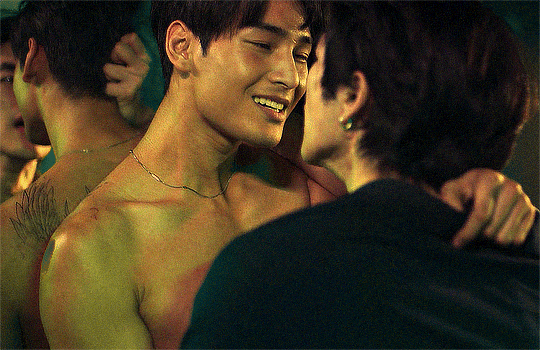
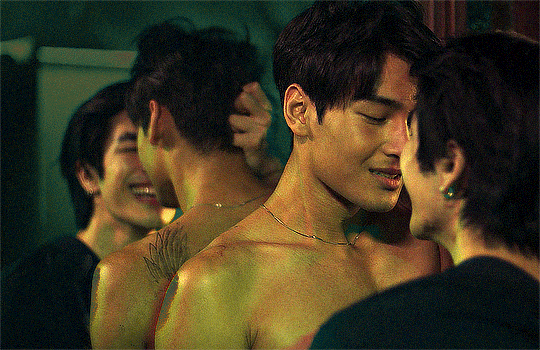
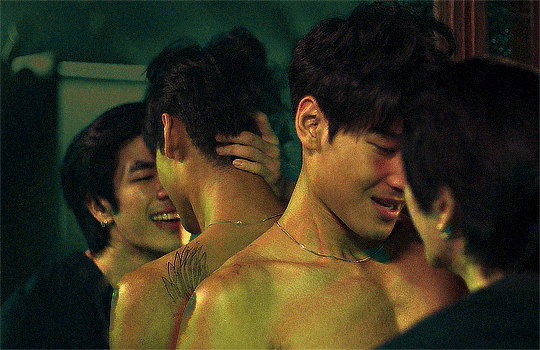
Apo Nattawin as Porsche and Mile Phakphum as Kinn KINNPORSCHE: THE SERIES (2022)
#it's their smiles for me#kinnporsche#kinnporsche the series#they are so gorgeous#episode 7#theeeee episode 7
6K notes
·
View notes
Text

i would too cause i’ll do anything but verbalize my feelings tbh…
8K notes
·
View notes
Text



Bas Asavapatr as Korn 4 Minutes, ep. 1
268 notes
·
View notes
Text
Bas's acting deserves a thousand awards 👏
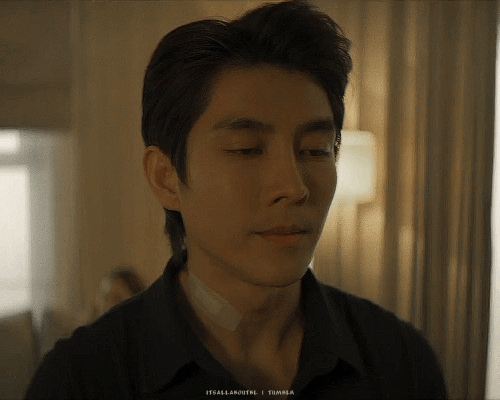



Bas Asavapatr as Korn 4 Minutes, ep. 5
208 notes
·
View notes











